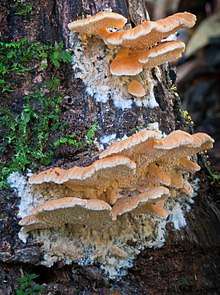Cerrena zonata
Cerrena zonata is a species of poroid fungus in the genus Cerrena (Family: Polyporaceae).
| Cerrena zonata | |
|---|---|
 | |
| Scientific classification | |
| Kingdom: | |
| Division: | |
| Class: | |
| Order: | |
| Family: | |
| Genus: | |
| Species: | C. zonata |
| Binomial name | |
| Cerrena zonata (Berk.) H.S.Yuan (2014) | |
| Synonyms[1] | |
| |
Taxonomy
The fungus was first described scientifically by Miles Joseph Berkeley in 1854 as Irpex zonatus.[2] In 1992, Leif Ryvarden moved it to Antrodia, a wastebasket taxon containing morphologically similar species.[3] It was transferred to the genus Cerrena in 2014.[4]
Habitat and distribution
Cerrena zonata is a white rot fungus that grows on dead hardwoods. In Asia, it has been recorded from India to Thailand, Vietnam, China, Far East Russia, and Japan. It is also in New Zealand, Australia, and Argentina.[5]
gollark: Interesting. Very interesting.
gollark: Possibly.
gollark: No.
gollark: It keeps clogging up with spare maple wood.
gollark: This is my phyto-gro machine. It will probably break in a few minutes when some ratios get out of balance, and it's drawing something like 200RF/t.
References
- "GSD Species Synonymy: Cerrena zonata (Berk.) H.S. Yuan". Species Fungorum. Kew Mycology. Retrieved 2018-05-03.
- Berkeley, M.J. (1854). "Decades of fungi. Decades XLIV–XLVI. Indian fungi". Hooker's Journal of Botany and Kew Garden Miscellany. 6: 161–174.
- Ryvarden, L. (1992). "On Irpex zonatus". Boletín de la Sociedad Argentina de Botánica. 28: 227–231.
- Yuan, Hai-Sheng (2014). "Molecular phylogenetic evaluation of Antrodiella and morphologically allied genera in China". Mycological Progress. 13 (2): 353–364. doi:10.1007/s11557-013-0921-7.
- Núñez; M.; Ryvarden L. (2001). "East Asian polypores". Synopsis Fungorum. 14: 224. Cite journal requires
|journal=(help)
This article is issued from Wikipedia. The text is licensed under Creative Commons - Attribution - Sharealike. Additional terms may apply for the media files.